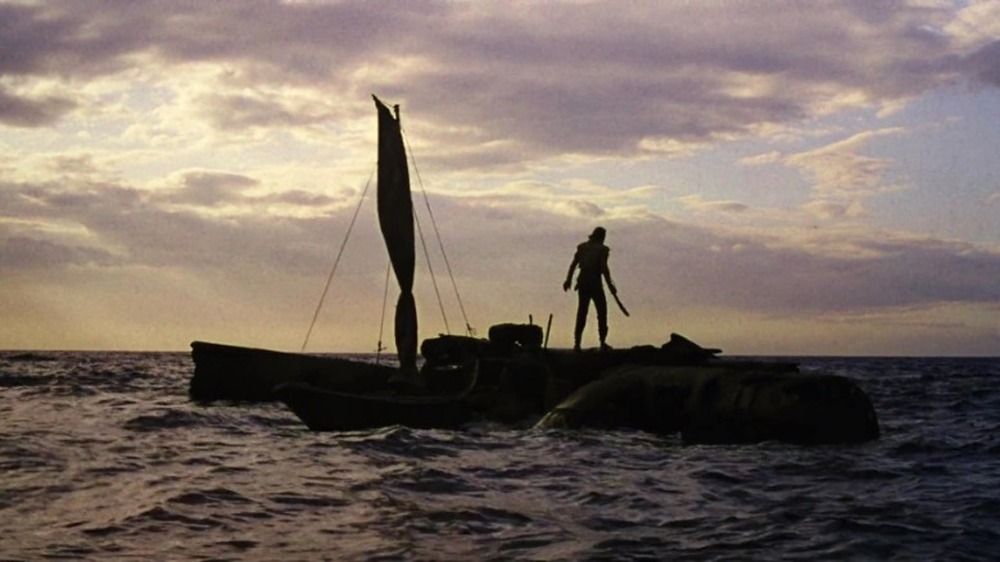Waterworld Held This Record Before Being Dethroned By Titanic
For many years, the 1995 Kevin Costner blockbuster Waterworld had to endure the reputation of a "flop." Though its high concept of a future Earth completely covered in water was highly unique, the movie itself was lambasted by contemporaneous critics and grossed only $88 million in the U.S. box office (via Box Office Mojo), a figure well below Universal Studios' expectations. It wasn't until Waterworld got a second life on TV and home video that it became a staple of '90s cinema and a major nostalgia object.
Among the many signs of its comeback success, you could point to the multi-platform video game inspired by it, or the sheer amount of merchandise it spawned, or the incredibly popular Waterworld: A Live Sea War Spectacular attraction found at Universal Studios parks around the globe. In fact, nowadays, Waterworld is more often remembered as an underrated childhood favorite than as an infamous turkey. Younger viewers might even be inclined to ask themselves what about the movie could have been considered so catastrophic, when at worst it's just a harmlessly fun action-adventure flick with some cool world-building.
There is, in fact, a reason Waterworld was made into a Hollywood punching bag for years. To understand its failure, you have to factor in a certain record it broke, which would be surpassed by Titanic two years later.
Waterworld became the most expensive movie ever at the time it was made
Up until 1995, no movie had ever been confirmed as costing much more than $100 million to make. The biggest budget of all time, for the Arnold Schwarzenegger flick True Lies, was placed somewhere roughly between $100 million (via Washington Post) and $120 million (via Entertainment Weekly) by reports. So Waterworld's eventual $175 million budget didn't just break the record: it positively shattered it.
In fact, the idea of investing that much money into a movie was so unheard-of at the time, Universal didn't actually agree to it. According to a 1994 Los Angeles Times report, the movie was greenlit with a $100 million budget, but nobody anticipated just how difficult it would be to shoot so many complex action scenes on open water and maintain a 500-person crew on a floating set off the coast of Hawaii. The stories about Waterworld going wildly over budget and becoming a headache for Universal execs began to circulate long before the movie was even out, and the behind-the-scenes heat became so great that director Kevin Reynolds ended up quitting during post-production (via SFGATE).
After the Times reported that the movie had ballooned to "a projected budget of around $135 million and [was] already two weeks behind schedule," its budget grew even further, ultimately topping off at the $175 million sum now listed by Box Office Mojo. Waterworld arrived in theaters in July 1995 with a pre-stamped "trainwreck" seal, and, sure enough, its $264 million worldwide gross wasn't nearly enough for the studio to break even, even if the movie later became profitable on home video (via Deadline).
The contrast to Titanic is stark: Though James Cameron's epic romance broke Waterworld's budget record at $200 million, it also went on to become the highest-grossing film of all time, a title it held for over 12 years (via The Hollywood Reporter).

